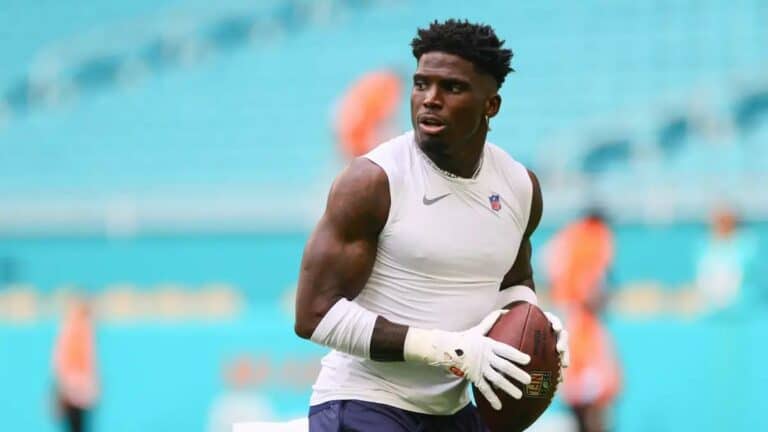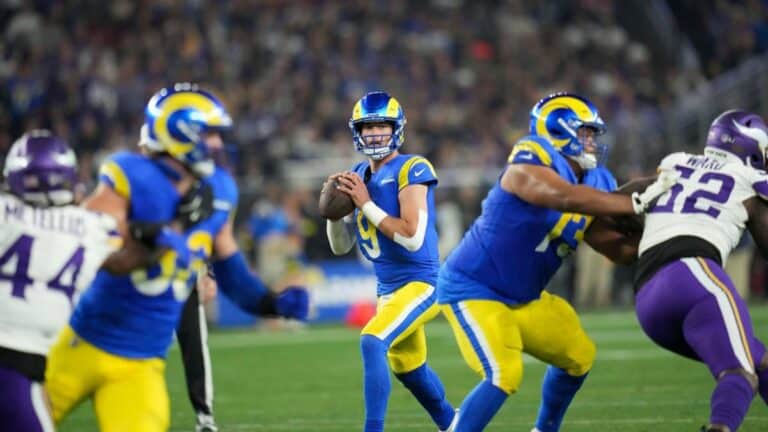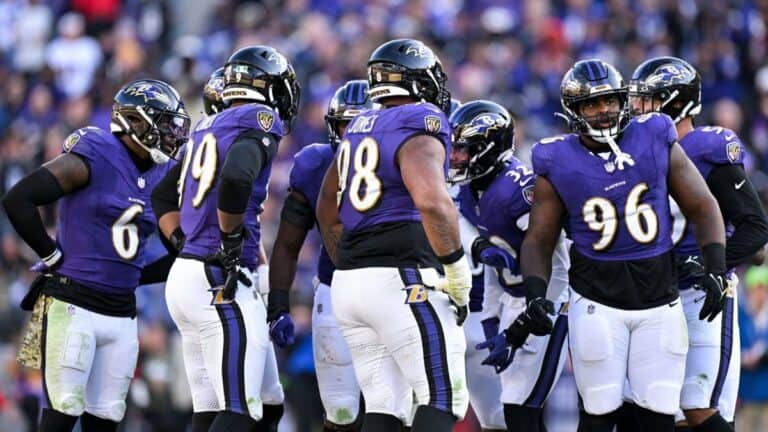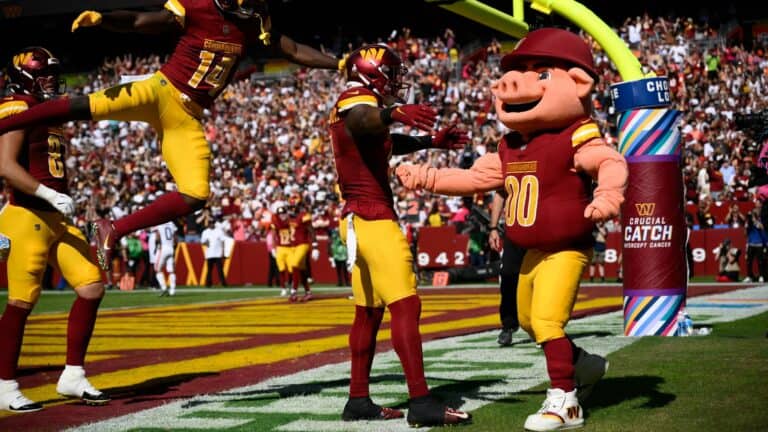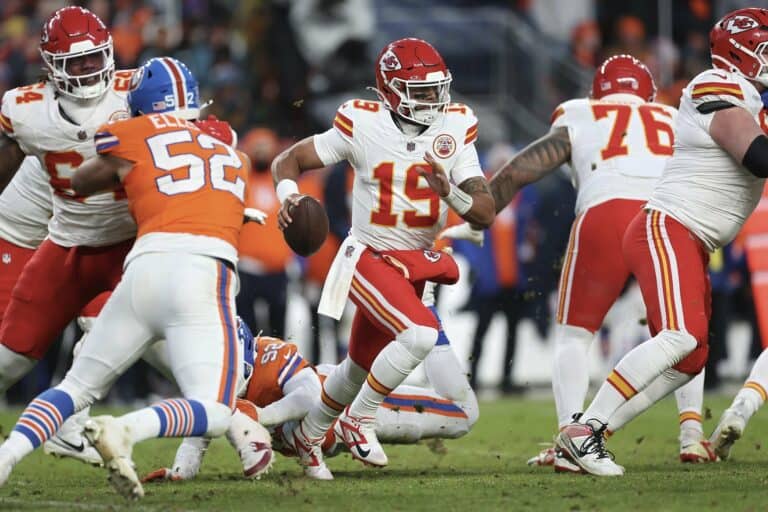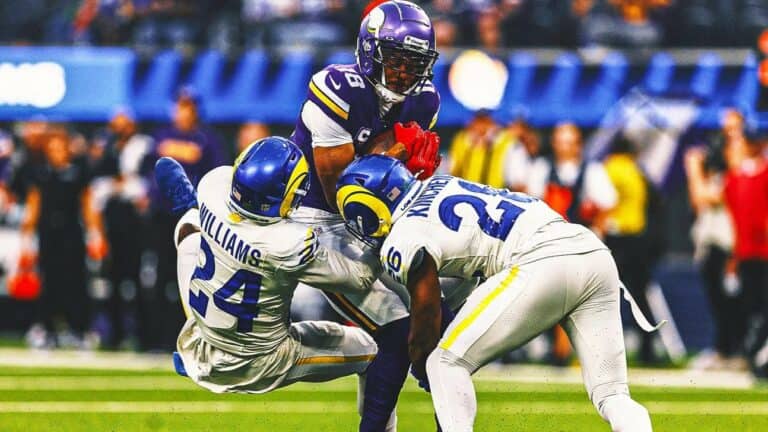NFL Betting

 BetOnline
BetOnline
Bonus
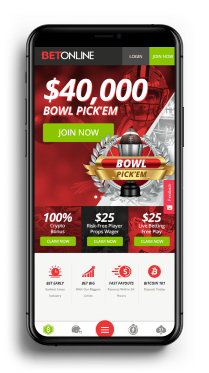
NFL Betting News
Featured Futures
NFL FOOTBALL BETTING
Introduction to NFL Football Betting
In one form or another, the sport of professional football is the focal point of sports betting around the world. Internationally, it’s the game Americans call ‘soccer’ that dominates the sports scene both in terms of popularity and betting action. The only single day event that surpasses the NFL Super Bowl for total amount bet is the Champions’ League soccer final. In Europe and many other parts of the world football (or soccer) betting transcends sports and is part of the fabric of the culture itself. In the United States, however, it’s the game that is called ‘American Football’ elsewhere in the world and more specifically pro football as played by the National Football League (NFL).
Based on revenue data from Nevada’s sports books the significance of NFL football wagering is evident, comprising nearly 40% of all sports betting action written in the ‘Silver State’. If anything, the NFL is responsible for an even larger chunk of wagering revenue at other sports books targeting a North American based clientele. The annual NFL championship game—known to the zeitgeist as the Super Bowl—is the biggest single day wagering event in North America and second in the world behind only the aforementioned Champions’ League Final. And as the case with soccer in Europe, the NFL is such an ingrained part of American culture that pointspreads are part of the common vernacular. As such, you’ll hear people who have never placed a bet in their lives discussing pointspreads and ‘over/under’ numbers.
Given its current dominance of the United States sporting scene its hard to believe that the National Football League struggled to find traction for years and was considered to be a ‘secondary sport’ until the second half of the twentieth century behind baseball, horse racing, boxing and other sports. The current incarnation of the NFL dates back to 1922 when the eleven team American Professional Football Association (APFA) changed its name to the National Football League. The popularity of professional football grew slowly but steadily throughout the twentieth century. The first major catalyst toward the NFL’s current states was a merger with the rival American Football League (AFL) finalized in 1970. A series of expansion teams have been added over the past four decades growing the NFL to a total of thirty-two teams divided into two conferences — the American Football Conference (AFC) and National Football Conference (NFC).
The meteoric rise of the league’s popularity throughout the twentieth century to their current status as the most financially successful sports league in the world was due to a confluence of factors. It is a sport that almost seems made for television and was a perfect fit for a new medium in the mid 20th century. As television technology improved, broadcasters were able to add more depth and context to their game coverage. The league refined the rules over the years to make the sport more exciting and as it became more financially successful it was able to attract better athletes which produced more entertaining and competitive action. Gambling also played a part—NFL football was a profitable sport for bookmakers and a very exciting betting opportunity for players.
NFL Football Involves Serious Money
The NFL isn’t just the most popular sport in America—it’s the most lucrative sports league in the world. The popularity of the league relative to all other professional sports continues to grow. Today, it’s not even close. A 2018 Gallup poll sought to quantify Americans’ favorite sport to watch. 37% indicated that it was ‘American football’. More significantly, football was the only sport that garnered more than 10% of respondents. Baseball was a distant second place with 9% indicating it was their favorite sport. The ‘other’ type of football is also growing in popularity—in third place was soccer with 7% of responses indicating it as a favorite sport. 2018 was only the second time in history that any sport other than football, baseball or basketball was indicated as the favorite of more than 7% of individuals polled (NASCAR auto racing measured at 7% in 1997 but has been unable to maintain that plateau. This data clearly indicates that although the overall sports viewership landscape is changing dramatically football has not only held on to their spot as the top but has opened up a formidable lead over the ‘field’.
Based on the Nevada Gaming Control Board data cited earlier it’s obvious that the NFL is the biggest betting sport in the United States but that doesn’t indicate just how dominant it is in the overall North American marketplace. In fact, the dominance of football at the betting window is even more pronounced than among viewers and fans. A 2017 survey of US sports bettors revealed that 78% considered football as their favorite wagering sport. Interestingly, NFL football barely cracks the top ten list of ‘most popular betting sports’ internationally. It ranks #9 on the list well behind soccer, cricket, tennis, rugby and even handball and volleyball.
Despite this relatively small wagering footprint in Europe, Asia and elsewhere the amount of money bet on NFL football is staggering. The 2018 Super Bowl attracted $158.6 million in betting action in the state of Nevada alone. Experts suggest that Nevada’s sports betting revenue amounts to only 1 or 2 percent of the worldwide total meaning that the total amount of money bet on the Super Bowl worldwide is in the billions of dollars. Data from the Nevada Gaming Control Board indicates that since 1992 bettors have wagered over $30 billion dollars US on NFL and college football.
National Football League gambling looks like a ‘no brainer’ today but it owes much of its growth to an unrelated event during the mid 20th century. That was the invention of the pointspread which was created to solve a problem that had long vexed bookmakers and bettors alike. Bettors have always loved to bet on successful, popular teams but these teams were invariably huge favorites. At the same time, the public has never been fond of 'betting a lot to win a little' which made laying huge odds for a small payout to back a popular team very unattractive. Bookies were aware that this problem was both bad for their bottom line but also made betting less enjoyable for their customers. The development of the pointspread elegantly solved this conundrum and quickly grew in popularity to become the most popular form of football betting.
So what does the pointspread do? The recreational sports bettor will tell you that it's the bookmaker's 'prediction' of who will win the game. That is technically incorrect and understanding the intricacies of the pointspread is crucial to a more sophisticated level of sports betting and handicapping. The intention of the pointspread is to split action evenly between both sides of a betting proposition such as a NFL football game. This keeps the money balanced for the bookmaker and keeps the game much more entertaining for the bettor. Understanding how pointspreads are made and what they mean is more important in NFL football than any other betting sport and thus we’ll cover them in detail throughout this article.
The Most Common Types of NFL Football Bets
Point Spread Bets
The pointspread bet revolutionized betting on both college and professional football and remains the most popular form of betting on the sport. As noted above, the pointspread was invented to better facilitate betting interest on both sides of a game and to serve as way to make games between stronger and weaker teams more competitive from a wagering standpoint.
The easiest way to explain the function of NFL pointspreads is by example. We’ll use an actual game from last season to do this, more specifically the December 10, 2017 game between the Oakland Raiders and Kansas City Chiefs. The Chiefs were the home team and closed as a 4.5 point favorite (sports betting shorthand designates the favorite with a ‘minus’ sign, so the Chiefs were -4.5 in that game). The Raiders, conversely, were 4.5 point underdogs (shown with a ‘plus’ sign, making the Raiders +4.5).
In a pointspread bet, a favorite must win the game by a larger margin than indicated by the pointspread. So in the example above, if you backed the Chiefs to win the game they’d have to do so by 5 or more points for you to cash your bet. If the margin lands right on the pointspread, it’s a ‘push’ and all wagers are refunded. Obviously, this can’t happen with a pointspread that involves a half point like the one in our example.
If you wager on the underdog, they must either win the game outright OR lose by less than the pointspread. In the example above, a bet on the Raiders would have been victorious if they won the game outright or lost by less than 4. As it happened, the Chiefs dominated the contest and held off a furious fourth quarter Raiders comeback to win 26-15. They easily covered the pointspread making bettors who took the Chiefs minus the points winners.
Over/Under or Totals Bets
The point spread bet is the overwhelmingly most popular type of NFL bet but the ‘Over/Under’ or ‘Totals’ bet is a solid second. The bettor bets that combined score of the two teams will be more or less than a set number (known as the ‘total’ on the game). Once again, we’ll use the December 10, 2017 game between the Raiders and Chiefs as an example. The total on the game was 48.5 and would be shown in this format at a sportsbook:
OAKLAND RAIDERS 48.5
KANSAS CITY CHIEFS -4.5
There is a general convention for North American sports books that lists the home team at the bottom. The -4.5 by the Chiefs’ name is the pointspread and the 48.5 by the Raiders’ name is the total. Note that there are a variety of different convention for game and bet formats throughout the world but this example is based on the predominant form used by North American facing books.
Since the total is 48.5 the bettor will try to determine if the combined final score will be 49 or higher going ‘Over’ the total or 48 or lower going ‘Under’ the total. As is the case with the pointspread, if the score of the game lands right on the total, it’s a ‘push’ and all wagers are refunded. Once again, this can’t happen with a total that involves a half point like the one in our example.
Recreational players are becoming more comfortable with totals wagers but they have been popular among ‘sharp’ players for decades. To find winning positions, experienced handicappers evaluate a wide range of factors including style of play, field surface, injuries and even the weather.
Moneyline Bets
Moneyline bets are are also common on NFL football. They’re the most fundamental and basic type of sports wager. The player bets on which team will win the game. Point spreads are not involved so if ‘his’ team wins, he cashes his bet. In most instances, moneyline ties are graded a ‘push’ and all stakes returned.
Typically, moneyline bets involve laying or taking odds on the favorite and underdog respectively. How these odds are conveyed will be different depending on which part of the world you’re in. In Europe, decimal or fractional odds are most common but in North American facing sportsbooks moneylines are used most frequently. We’ll return to our ‘sample’ NFL game between the Chiefs and Raiders to explain the bet more clearly.
OAKLAND RAIDERS: +180
KANSAS CITY CHIEFS: -210
Moneyline odds can be confusing to beginners—and foreign bettors used to fractional or decimal odds find them maddening—but once you get your head around them they’re easy to understand. In this example, a player that wants to bet the favored Kansas City Chiefs must lay -210 to win 100 or in monetary terms $210 to win $100. If the Chiefs are victorious, he’ll receive his original $210 stake back along with his $100 profit for a total of $280. If he’d rather back the Oakland Raiders the bettor will lay 100 to win 180, or $100 to win $180. If the ‘Silver and Black’ wins the bettor is returned his $100 stake back plus $180 in profit for a total of $280.
Other Types of NFL Football Bets
Horse racing has multi-race and multi-horse exotic bets such as the trifecta, superfecta and Pick 6. Sports betting also has a variety of bets other than the aforementioned ‘bread and butter’ bets (usually called ‘straight bets’).
Parlays
Sports betting at its most fundamental is day-in/day-out grind. There are few opportunities to ‘bet a little to win a lot’ on a day to day basis in sports betting. This is why parlays are so popular—and particularly in the NFL. Parlay bets are usually called ‘Accumulators’ or ‘Multiples’ outside of the United States. No matter the name, the premise is the same—a parlay bet involves a bettor making multiple selections (between two and fifteen). Every selection on the bet must win for the parlay to cash. The real appeal of the parlay is its high payouts—the more ‘legs’ included in the parlay the higher the return. Parlay payouts can vary from one sportsbook to another so as always it’s a good idea to shop around for the most favorable paytable. Here’s a Parlay Odds table that you might find at a sportsbook:
- 2 -> 13 to 5
- 3 -> 6 to 1
- 4 -> 10 to 1
- 5 -> 20 to 1
- 6 -> 40 to 1
- 7 -> 75 to 1
- 8 -> 100 to 1
- 9 -> 150 to 1
- 10 -> 300 to 1
- 11 -> 450 to 1
- 12 -> 600 to 1
- 13 -> 750 to 1
- 14 -> 900 to 1
- 15 -> 1500 to 1
Players can play parlays in one sport, multiple sports or in some cases the same game. Let’s go back to the ‘sample’ game we used above which took place in Week 14 of the 2017 season for an example of a three team NFL parlay:
Kansas City Chiefs -4.5 over Oakland Raiders
Kansas City/Oakland Under 48.5
Miami Dolphins +10.5 over New England Patriots
$100 to win $600
In this example all three legs of this three team NFL parlay were winners meaning that the player would receive a total of $700 which includes his original stake of $100 and $600 of profit. In the event that any leg of a parlay is a ‘push’ the usual practice is to pay out at the next lowest level. For example, if two legs of a three team parlay win and one leg ends in a ‘push’ it will be paid as a two team parlay (13 to 5). A two team parlay with a ‘push’ is usually considered a ‘straight bet’ for payment purposes. There are some exceptions—many Nevada sportsbooks offer ‘Ties Lose’ parlay cards where a ‘push’ in any game is treated the same as a loss. ‘Ties lose’ wagers typically pay higher odds than traditional parlay wagers. Some sportsbooks will put limitations on parlays such as not allowing certain sports to be included or not allowing side and total parlays on the same game (‘correlated parlays’).
Teasers
Teasers are hugely popular in the United States though they can be hard to ‘get your head around’ at first. There’s a good deal of debate if teasers are a ‘sharp play’ with good profit potential or a ‘sucker bet’ that is destined to be a longterm loser. Teasers are similar to parlays in that you need to win multiple betting positions to cash your ticket. The difference is that the player is allowed to ‘adjust’ the pointspread in his favor by a predetermined number of points on each play in exchange for a reduced payout. In NFL football, the most common point totals are 6, 6.5 and 7. Some sportsbooks have more conservative teaser rules which limit the number of teams you can use in each bet. At the other extreme, there are sportsbooks that offer more favorable rules with some even permitting players to mix NFL and college football plays or even football and basketball plays. Here are sample payout charts for football teasers:
6 point NFL football teasers:
Selections Made Payout Odds
- 2 -> 10 to 11
- 3 -> 8 to 5
- 4 -> 13 to 5
- 5 -> 9 to 2
- 6 -> 7 to 1
- 7 -> 10 to 1
- 8 -> 15 to 1
- 9 -> 20 to 1
- 10 -> 25 to 1
- 11 -> 35 to 1
- 12 -> 50 to 1
- 13 -> 75 to 1
- 14 -> 100 to 1
- 15 -> 150 to 1
6.5 point NFL football teasers:
Selections Made Payout Odds
- 2 -> 10 to 12
- 3 -> 7 to 5
- 4 -> 12 to 5
- 5 -> 4 to 1
- 6 -> 6 to 1
- 7 -> 9 to 1
- 8 -> 12 to 1
- 9 -> 15 to 1
- 10 -> 20 to 1
- 11 -> 25 to 1
- 12 -> 35 to 1
- 13 -> 50 to 1
- 14 -> 75 to 1
- 15 -> 100 to 1
7 point NFL football teasers:
Selections Made Payout Odds:
- 2 -> 10 to 13
- 3 -> 6 to 5
- 4 -> 2 to 1
- 5 -> 7 to 2
- 6 -> 5 to 1
- 7 -> 8 to 1
- 8 -> 10 to 1
- 9 -> 12 to 1
- 10 -> 15 to 1
- 11 -> 20 to 1
- 12 -> 25 to 1
- 13 -> 35 to 1
- 14 -> 50 to 1
- 15 -> 75 to 1
Once again, we’ll use the action of Week 14 of the 2017 NFL season for an example. Below are the original pointspreads on three games:
Kansas City Chiefs -4.5 over Oakland Raiders
Atlanta Falcons -2.5 over New Orleans Saints
Miami Dolphins +10.5 over New England Patriots
If a player were to make a 7 point teaser play with the teams listed first in the above example it would look like this :
Kansas City Chiefs +2.5 over Oakland Raiders
Atlanta Falcons +4.5 over New Orleans Saints
Miami Dolphins +17.5 over New England Patriots
Since all three of these teams were winners the bettor would be paid 6/5 or $120 for a $100 bet.
There is also a related bet called a ‘pleaser’ that is basically a teaser in reverse. Instead of moving the line in your favor you move the line *against* you in return for higher odds payouts. These are nowhere near as popular as teasers.
Proposition Bets
The most popular NFL football proposition bets take place during the Super Bowl. Sportsbooks compete against one another to offer the most—and the most unique—bets on not only the outcome of the Super Bowl itself but player performance, team statistics and even the halftime show and commercials during the TV broadcast! Proposition bets are becoming more common during the NFL regular season, and particularly since the advent of daily fantasy sports wagering.
In reality, a proposition wager (or ‘prop bet’) is a name that gets attached to any bet type that doesn’t ‘fit’ anywhere else. Generally as it relates to the NFL, the term ‘proposition bet’ is used to describe wagers on ancillary outcomes that typically don’t directly impact the result of the game itself.
One type of NFL football proposition wager is the ‘contest style’ or ‘pick the player’ prop. Here’s an example of such a prop from Super Bowl LI between the New England Patriots and Atlanta Falcons:
PLAYER TO SCORE THE FIRST TOUCHDOWN FOR THE ATLANTA FALCONS?
| Devonta Freeman (Atlanta): | +500 |
| Julio Jones (Atlanta): | +350 |
| Tevin Coleman (Atlanta): | +600 |
| Taylor Gabriel (Atlanta): | +600 |
| Mohamed Sanu (Atlanta): | +600 |
| Aldrick Robinson (Atlanta): | +1500 |
| Levine Toilolo (Atlanta): | +1000 |
| Austin Hooper (Atlanta): | +1000 |
| Matt Ryan (Atlanta): | +1000 |
| FIELD – ALL OTHERS: | +450 |
Another type of prop bet is called by several names including ‘stats prop’, ‘general prop’ or ‘in game prop’. Some variations of this prop require the bettor to decide if a specific event will or will not occur. Once again, several examples from Super Bowl LI:
WILL THERE BE A SAFETY IN THE SECOND HALF?
Yes: +1250
No: -2100
WILL A SPECIAL TEAMS OR DEFENSIVE TOUCHDOWN BE SCORED?
Yes: +120
No: -150
WILL THERE BE A SUCCESSFUL TWO POINT CONVERSION?
Yes: +250
No: -325
Prop bets can also require a player to play ‘Over’ or ‘Under’ a statistical total:
TOTAL TOUCHDOWNS IN GAME?
Over 4.5: -450
Under 4.5 +325
TOTAL TOUCHDOWN PASSES IN GAME?
Over 3.5: -150
Under 3.5: +130
TOTAL YARDAGE OF ALL TOUCHDOWNS SCORED IN GAME?
Over 102 yards: -110
Under 102 yards -110
Another variant is the ‘team comparison’ prop. This prop, as the name suggests, compares the teams involved in the game with the player usually required to decide which will be the first to do a listed event. More examples from Super Bowl LI:
TEAM TO RECEIVE OPENING KICKOFF?
New England: -110
Atlanta: -110
WHICH TEAM WILL PUNT FIRST?
Atlanta: -110
New England: -110
TEAM WITH MOST PUNTS?
Atlanta: +120
New England: -140
There’s no limit to the variety of props that bookmakers can come up with. Regular season games will seldom have any of the ‘unusual’ props found in the Super Bowl but the best sports books offer plenty of variety during every NFL game.
Futures Bets
Futures betting is often called ‘Ante Post’ ‘Long Term’ or ‘Outright’ wagering in Europe. A NFL futures bet is placed on the winner of a championship, a league or a division. Alternately, the can be on individual players—statistical leaders (eg: Top Rushing Yardage in NFL) or award winners (Most Valuable Player). In a futures wager there are multiple betting interests available at different prices to reflect their respective odds of winning. Futures bets can be often well before the outcome is determined—for example, many sportsbooks have been taking bets on the winner of the 2019 Super Bowl (Super Bowl LIII since immediately after the conclusion of the 2018 game (Super Bowl LII).
Here are the preseason 2018 odds to win Super Bowl LIII:
| New England Patriots: | +500 |
| Philadelphia Eagles: | +900 |
| Green Bay Packers: | +900 |
| Pittsburgh Steelers: | +1000 |
| Los Angeles Rams: | +1100 |
| Minnesota Vikings: | +1200 |
| New Orleans Saints: | +1700 |
| Atlanta Falcons: | +1800 |
| Sam Francisco 49ers: | +2000 |
| Jacksonville Jaguars: | +2000 |
| Dallas Cowboys: | +2200 |
| Los Angeles Chargers: | +2200 |
| Houston Texans: | +2500 |
| Carolina Panthers: | +2500 |
| Kansas City Chiefs: | +2800 |
| Seattle Seahawks: | +3300 |
| Denver Broncos: | +4000 |
| Tennessee Titans: | +4000 |
| Baltimore Ravens: | +4000 |
| New York Giants: | +4000 |
| Washington Redskins: | +5000 |
| Indianapolis Colts: | +6600 |
| Buffalo Bills: | +6600 |
| Tampa Bay Buccaneers: | +6600 |
| Arizona Cardinals: | +8000 |
| Cincinnati Bengals: | +8000 |
| Miami Dolphins: | +8000 |
| Cleveland Browns: | +8000 |
| Chicago Bears: | +10000 |
| New York Jets: | +15000 |
Live Betting
Live betting—also known as ‘in game’ or ‘in running’ betting—has been ubiquitous in European soccer for years but is now becoming common for NFL football games as well as games in other sports. As the name suggests, live betting is simply betting that takes place after the game has started. It’s not so much a type of bet itself as it is a circumstantial modifier to every other bet type. The specific bets available to a better in a live betting situation vary widely from one sportsbook to another determined not only by their individual bookmaking philosophy but by the technological power of their wagering platform. Most every sportsbook will offer at minimum updated side and total prices throughout the game along with quarter and half sides and totals. The best books with the most state of the art live wagering platform will offer dozens—even hundreds—of different bets available to players on every NFL football game.
